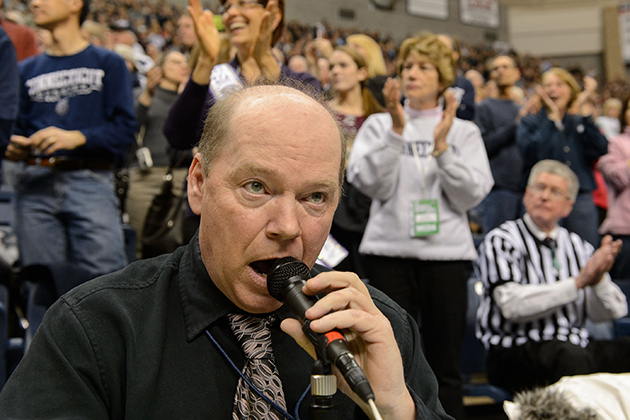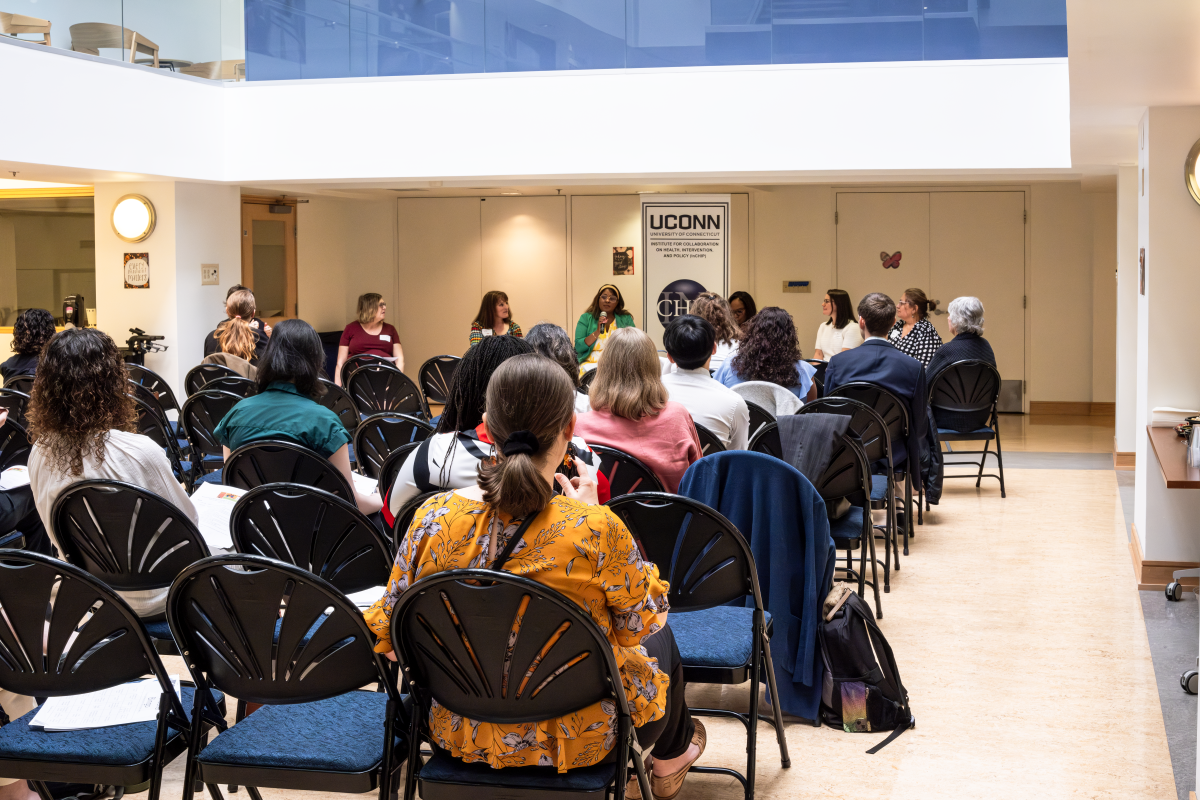
The shrill tweet of the referee’s whistle sounds sharply above the crowd noise at Gampel Pavilion during a women’s basketball game. Sitting at the scorer’s table at center court between the team benches, public address announcer John Tuite looks toward the official’s hands to see which fingers indicate the number of the player who committed the foul before speaking into the microphone in front of him.
“Foul on No. 14, Bria Hartley. First personal; first team foul. Time out on the floor,” Tuite says, drawing a groan from the crowd, before continuing on to read a promotional announcement.
Tuite’s baritone is familiar to fans of UConn basketball and football at home games at Gampel Pavilion, the XL Center in Hartford, and Rentschler Field in East Hartford. A native of Storrs, he is also a veteran radio broadcaster for listeners of WILI in Willimantic, where he is known on the FM band as “Newsman John” on the Pete Nichols’ morning program and on the station’s AM side as the host of the “Vinyl Frontier.”
“I’ve got the best seat in the place,” says Tuite, who has been the Huskies’ home voice on and off since the 1990s and the regular PA announcer for football and basketball for the past five years. “I’m completely spoiled that I get to see the games from this vantage point.”
A career that’s grown with the program
A graduate of Morehead State University in Kentucky, Tuite was a contemporary of former New York Giants quarterback Phil Simms, and started doing radio and television broadcasts of high school basketball and football in the Bluegrass State.
Following graduation in 1980, Tuite returned to Connecticut and became a community volunteer at WHUS, the UConn student station, filling in at times when students were not available for games. He started doing men’s soccer games as an analyst, and eventually added play-by-play for women’s soccer and women’s basketball games to his repertoire. He continues to broadcast men’s soccer games, working with student broadcasters.
“It was very lucky for me,” he says. “Who knew when Jim Calhoun and Geno Auriemma were hired there would be this mass growth in UConn sports? When I first got involved in field hockey, women’s soccer and men’s soccer made it three for three in Final Fours. There was a lot of sentiment on campus that was our niche. We couldn’t beat the St. John’s, Georgetowns, and Villanovas of the world in basketball.”
Tuite arrives early on the day of a game to review the dozen or so pages of promotional messages he will read during the course of a game and to prepare the starting lineups he will announce following the National Anthem. He writes out the starting lineups by hand, saying it helps to commit the information to his memory, particularly pronunciations of players from the visiting team. He prefers to speak with the sports information staff from the visiting team or an assistant coach in order to hear the proper way to say a player’s name.
“I like to hear it from a human voice because the phonetic spellings [on the media sheets] can be ambiguous or inaccurate compared to what people hear from the human ear,” he says. “Sometimes I talk with an assistant coach or trainer, find out if there is a nickname they prefer which is easier, such as Jon instead of Jonathan or Neek instead of Shaneeka.”
Tuite says when he introduces the starting lineups for basketball he brings out the student-athletes by seniority.
“I always do it by seniority, youngest to the oldest, regardless of whether someone is a star attraction. It’s an honor that should be bestowed on somebody who’s put in the blood sweat and tears of the practice and academics,” he says. “For example if Caroline Doty [’13 (CLAS)] starts, she gets priority over Kelly Faris [’13 (CLAS)] as a senior, because she’s a redshirt senior [a fifth-year player].”
Challenges of the job
During a basketball game, Tuite says it can be difficult to see everything from his position, even though it is in the middle of the court. Players and officials run by or can block his view when the whistle blows.
“Seeing the foot on the floor for a three-point play, the view is better from the stands. Certain circumstances, such as a double foul, and keeping track of who gets the ball, it’s not always clear,” he says, noting that officials at times will signal the number of the player committing as they see it, not reversing the number on their hands for the scorer’s table to see correctly, even though the official is verbally giving the number.
Tuite says he tries to maintain an even tone in announcing who scored during a game, providing excitement when the game dictates a more enthusiastic call of the play.
“It’s important to recognize the situation and what’s appropriate,” he says. “Trying to generate fake excitement never works. At the same time, I’d be a bad PA announcer if I was a monotone for the home team. With some NBA announcers it’s ultra-annoying and disingenuous if the home team is down by 15 and you call with fake enthusiasm or long drawn out delivery. Everybody can recognize it for what it is. I try to approach it like an umpire in baseball. You want to be as invisible as possible. There’s a big difference in how the umpire at first calls a routine out versus a play at the plate, when there’s a great collision for a safe call.”
Announcing at Rentschler Field provides not only a different perspective – Tuite sits high above the field on the right side of the fifth floor press box – but other challenges. A spotter assists him with identifying who carries the ball or makes a tackle, and there are more promotional marketing messages. There is also the on-field referee microphone for penalty announcements.
“[Sometimes] I’m getting a word in my headphone about doing an announcement and I have to cut a sentence short when I hear that click on the referee’s mic. You get a feel for it after a while,” he says. “It’s also different from what it was 15 years ago, now tossing to the video screen for the play of the game. It helps the experience of a fan. It shouldn’t be an inferior experience compared to watching it at home. Replays are missing if you don’t include them in today’s world.”
As to a memorable incident during a game, Tuite says it was a 1999 women’s game against UCLA at Gampel Pavilion. Following a missed free throw by the UCLA player, Swin Cash ’02 (CLAS) grabbed the rebound and then shot the ball into the UCLA basket instead of holding on to the ball or passing it off to a teammate. The players and coaches on the UConn bench could only laugh as Cash ran down the court shaking her head and then stopped to put a hand over her face.
“I said to myself, I’m not going to say anything here,” he says. “There’s a lot of times those are good things to live by.”


